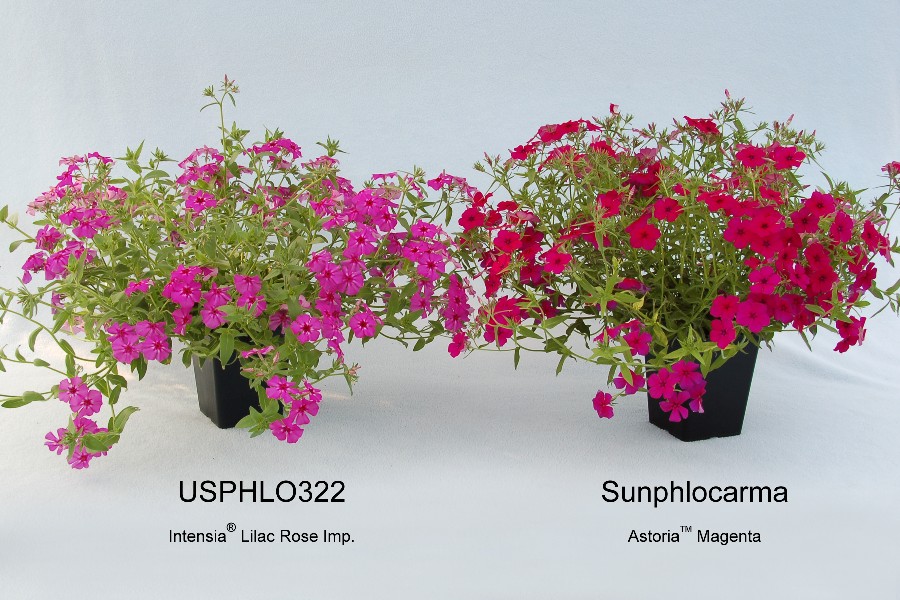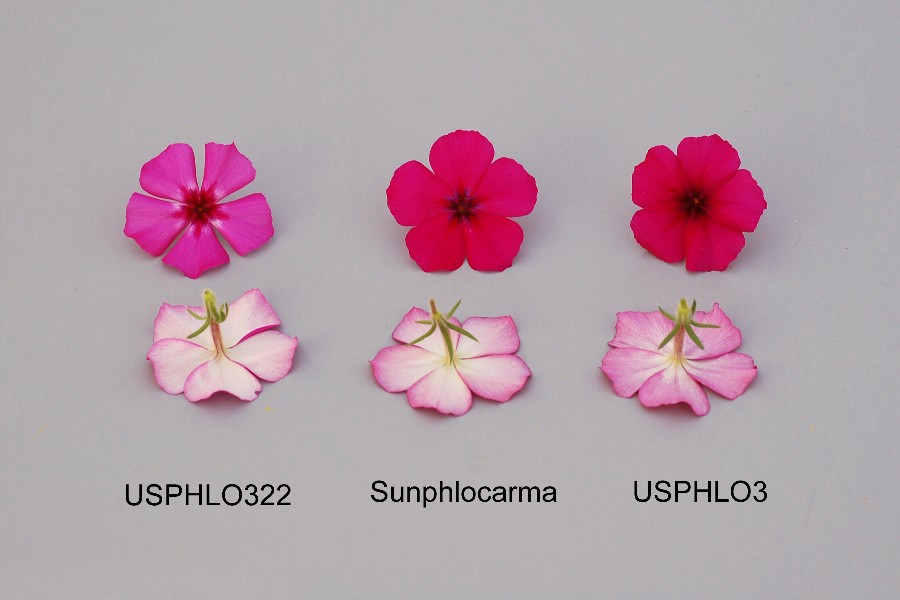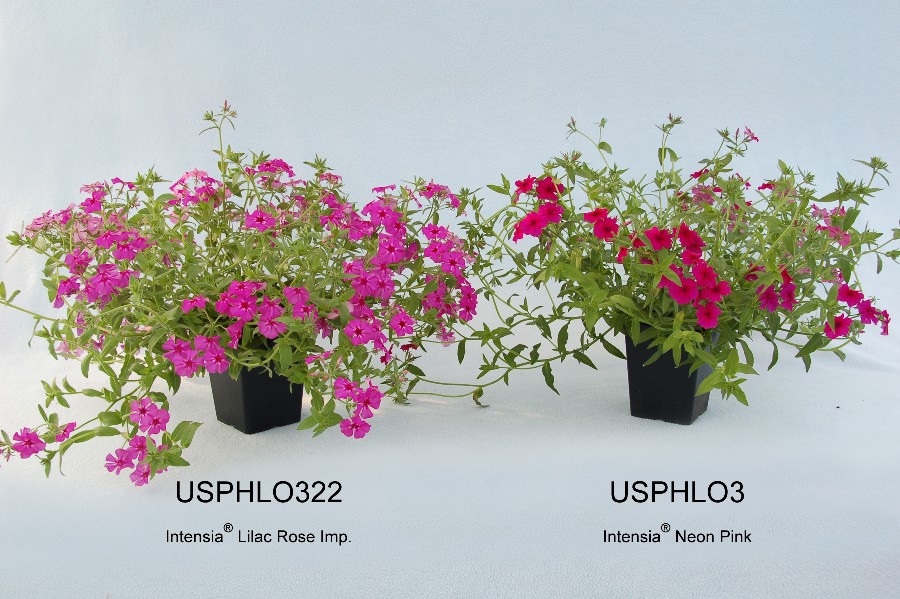USPHLO322
| Denomination: | 'USPHLO322' |
|---|---|
| Trade name: | Intensia Lilac Rose Improved |
| Botanical Name: | Phlox |
| Applicant/Holder: |
Plant 21 LLC 32149 Aquaduct Road Bonsall, California 92003 United States of America |
| Breeder: |
Ushio Sakazaki, Shiga, Japan |
| Agent in Canada: |
BioFlora Inc. 38723 Fingal Line R.R. #1 St. Thomas, Ontario N5P 3S5 Canada Tel: 519-317-7511 |
| Application Date: | 2005-05-06 |
| Application Number: | 05-4884 |
| Grant of Rights Date: | 2007-06-08 |
| Certificate Number: | 2804 |
| Date rights surrendered: | 2010-07-15 |
Variety Description
Varieties used for comparison: 'Sunphlocarma' (Astoria Magenta) and 'USPHLO3' (Intensia Neon Pink)
Summary: USPHLO322' has a slightly shorter plant height than 'USPHLO3'. The plant width of 'USPHLO322' is wider than 'Sunphlocarma'. 'USPHLO322' has a larger leaf than 'Sunphlocarma'. The leaf of 'USPHLO322' is slightly wider than 'USPHLO3'. 'USPHLO322' has denser pubescence on the lower side of the leaf than 'Sunphlocarma'. The flower petal of 'USPHLO322' has a weaker fringe than 'USPHLO3'. 'USPHLO322' has a violet petal colour on the upper side while it is purple in the reference varieties. The eye zone of 'USPHLO322' is a different shape than the reference varieties and is purple in colour, while the reference varieties have a purple red eye zone.
Description:
PLANT: annual type, semi-upright to horizontal growth habit, flowers early in the season
LEAF: subulate shape, glandular stickiness present, dense pubescence on upper and lower side, medium green colour
INFLORESCENCE: flat shaped, compound cyme type
FLORET: star shape, tricoloured (including eye), purple colour group
PETAL: obtuse and cuspidate shaped apex, weak fringing of the margin, violet (RHS N78A/B) apical zone on upper side, white (RHS 155B) basal zone, star shaped eye that is purple (darker than RHS N74A), violet (RHS 77C) apical zone on lower side, whiter (whiter than RHS 155B) basal zone on lower side.
Origin & Breeding History: 'USPHLO322' is the product of a planned breeding program with the objectives to create new vigorous Phlox varieties that are heat tolerant and have a long flowering period. 'USPHLO322' originated from a controlled cross conducted in Hikone, Japan on March 29, 2001, with a seed raised Phlox drummondii variety with magenta flowers as the female parent and a wild Phlox sp. as the male parent. The new phlox was selected as a single plant from the resultant progeny on May 24, 2002. Selection criteria included strong plant vigour, tolerance to heat, long flowering period and low seed set.
Tests & Trials: Tests and trials were conducted in a polyhouse during the spring of 2006 in St. Thomas, Ontario. Trials included 15 plants each of the candidate and reference variety. Observations and measurements were taken from 10 plants. All colour measurements were made using RHS colour chart 2001.
Comparison tables for 'USPHLO322' with reference varieties 'Sunphlocarma' and 'USPHLO3'
Plant height (cm)
| 'USPHLO322' | 'Sunphlocarma' | 'USPHLO3' | |
|---|---|---|---|
| mean | 18.9 | 17.7 | 22.5 |
| std. deviation | 2.47 | 2.48 | 3.61 |
Plant width (cm)
| 'USPHLO322' | 'Sunphlocarma' | 'USPHLO3' | |
|---|---|---|---|
| mean | 46.7 | 38.0 | 44.8 |
| std. deviation | 3.44 | 2.66 | 3.99 |
Leaf length (cm)
| 'USPHLO322' | 'Sunphlocarma' | 'USPHLO3' | |
|---|---|---|---|
| mean | 4.0 | 3.2 | 4.0 |
| std. deviation | 0.27 | 0.26 | 0.53 |
Leaf width (cm)
| 'USPHLO322' | 'Sunphlocarma' | 'USPHLO3' | |
|---|---|---|---|
| mean | 1.4 | 1.0 | 1.1 |
| std. deviation | 0.22 | 0.15 | 0.26 |
Petal colour (RHS)
| 'USPHLO322' | 'Sunphlocarma' | 'USPHLO3' | |
|---|---|---|---|
| upper apical zone | N78A/B | darker than N74A | darker than N74A |
| upper basal zone | N155B | 53A | redder than N66A |
| eye zone | darker than N74A | v-shaped N81A-82A | v-shaped N81A |
| lower apical zone | 77C with N78B along margin | N74C with N74B along margin | N74C with N74B along margin |
| lower basal zone | N155B | 155C | 155C |
Click on image for larger view

Phlox: 'USPHLO322' (left) with reference variety 'Sunphlocarma' (right)
Click on image for larger view

Phlox: 'USPHLO322' (left) with reference variety 'USPHLO3' (right)
Click on image for larger view

Phlox: 'USPHLO322' (left) with reference varieties 'Sunphlocarma' (center) and 'USPHLO3' (right)
- Date modified: